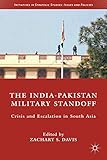The India-Pakistan military standoff : crisis and escalation in South Asia / edited by Zachary S. Davis.
Contributor(s): Davis, Zachary S.
Material type: TextSeries: Initiatives in strategic studies : issues and policies.Publisher: New York : Palgrave Macmillan, 2011Edition: 1st ed.Description: xvi, 240 p. : ill. ; 22 cm.ISBN: 9780230109384 (hardback); 0230109381 (hardback); 9780230338630.Subject(s): Nuclear weapons -- India | Nuclear weapons -- Pakistan | India -- Foreign relations -- Pakistan | Pakistan -- Foreign relations -- India | India -- Politics and government | Pakistan -- Politics and governmentDDC classification: 954.053 Other classification: POL011010 | POL001000 | POL034000
TextSeries: Initiatives in strategic studies : issues and policies.Publisher: New York : Palgrave Macmillan, 2011Edition: 1st ed.Description: xvi, 240 p. : ill. ; 22 cm.ISBN: 9780230109384 (hardback); 0230109381 (hardback); 9780230338630.Subject(s): Nuclear weapons -- India | Nuclear weapons -- Pakistan | India -- Foreign relations -- Pakistan | Pakistan -- Foreign relations -- India | India -- Politics and government | Pakistan -- Politics and governmentDDC classification: 954.053 Other classification: POL011010 | POL001000 | POL034000 | Item type | Current location | Call number | Status | Date due | Barcode | Item holds |
|---|---|---|---|---|---|---|
 Books
Books
|
Prof. G. K. Chadha Library
South Asian University |
954.053 I3925 (Browse shelf) | Available | SDC0003551 |
Browsing Prof. G. K. Chadha Library Shelves , Shelving location: General Stacks Close shelf browser

|

|

|

|

|

|

|
||
| 954.052 I272b Buffalo nationalism : | 954.052 T7724 Transforming India : | 954.053 H9182 Human development in South Asia 2006 : | 954.053 I3925 The India-Pakistan military standoff : | 954.053 J834f A feast of vultures : | 954.053 J834f A feast of vultures : | 954.053 J838p Pakistan : |
Includes bibliographical references and index.
Part I. The Historical and Political Background of the Crisis: 1. The roots of crisis: post-Kargil conflict in Kashmir and the 2001-2002 near-war / Praveen Swami; 2. Understanding the political-military context of the 2002 military standoff: a Pakistani perspective / Zafar Jaspal -- Part II. The Conventional Military Environment: 3. Military dimension of the 2002 India-Pakistan standoff: planning and preparation for land operations / Gurmeet Kanwal -- Part III. Managing the Nuclear Environment: 4. What was done to achieve strategic stability during the Cold War? Lessons South Asia? / Michael O. Wheeler; 5. Pakistan's nuclear force posture and the 2001-2002 military standoff / Feroz Hassan Khan -- Part IV. Outside Actors and Crisis Resolution: The United States' Role: 6. U.S. crisis management in South Asia'ss Twin Peaks Crisis / Polly Nayak and Michael Krepon; 7. The 2001-2002 crisis: a real-time view from Islamabad / David Smith -- Part V. Avoiding Future Crises: 8. Arms control, confidence building and nuclear risk reduction: a Pakistani perspective / Naeem Ahmad Salik -- Conclusion: lessons learned and unlearned / Zachary S. Davis.
"This book focuses on the 2001-2002 crisis that brought India and Pakistan to the brink of war. Like the 1999 Kashmir crisis and the 2008 Mumbai crisis, the 2001 attack on the Indian Parliament set in motion events that nearly spun out of control. India's military mobilization raised the specter of full-scale war and the possibility that Pakistan, faced with the defeat of its Army, would resort to nuclear weapons. The volumes authors focus on five main areas: the political history that led to the crisis; the conventional military environment during the crisis; the nuclear environment during the crisis; coercive diplomacy and de-escalation during the crisis; and arms control and confidence-building measures that can help South Asia to avoid similar crises in the future."--
